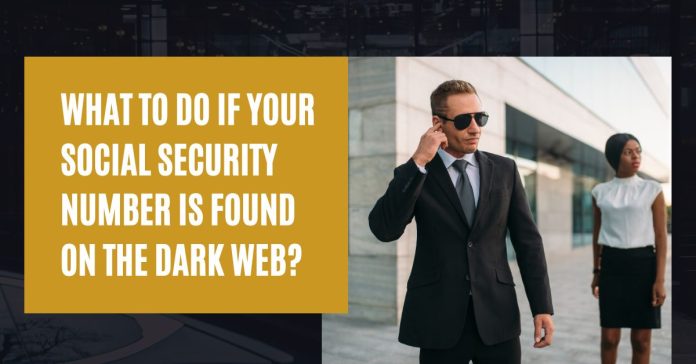In this post, you will learn what to do if your social security number is found on the dark web.
In today’s digital age, identity theft and cybercrime have become increasingly prevalent threats. One of the most alarming scenarios for any individual is discovering that their Social Security number (SSN) has been found on the dark web.
Your SSN is a crucial piece of personal information that can be used to commit fraud and identity theft. Acting quickly and decisively to protect your identity and financial well-being is essential in this situation.
This comprehensive guide will walk you through the steps you should take if your Social Security number is discovered on the dark web.
Table of Contents
Understanding the Dark Web and Its Implications
Before delving into the action steps, it’s important to understand the dark web and why finding your SSN there is cause for concern.
The dark web is a part of the internet that isn’t indexed by standard search engines and requires special software or configurations. It’s often associated with illegal activities, including the buying and selling of personal information.
When your SSN appears on the dark web, it means that cybercriminals potentially have access to this sensitive data and could use it for nefarious purposes.
Implications of your SSN being on the dark web include:
- Identity theft
- Financial fraud
- Tax fraud
- Medical identity theft
- Employment-related fraud
Now that we understand the gravity of the situation, let’s explore the steps you should take to protect yourself.
How To Protect Yourself if Your Social Security Number Is Found On The Dark Web
Step 1: Consider Identity Theft Protection Services
While not necessary for everyone, identity theft protection services can provide additional peace of mind:
- Research reputable services that offer comprehensive monitoring and recovery assistance.
- Understand what features are included and at what cost.
- Remember that many of these features can be done on your own for free.
Identity Protection Services
If your Social Security number has been compromised, consider using identity protection services to help safeguard your personal information and monitor for potential misuse. Here are three reputable services to consider:
OmniWatch
- Offers comprehensive identity monitoring and protection
- Scans dark web marketplaces for your personal information
- Provides real-time alerts for suspicious activity
- Offers identity theft insurance and recovery assistance
Incogni
- Focuses on data broker removal to reduce your online footprint
- Continuously requests the removal of your information from data brokers
- It helps minimize the spread of your data online
- Provides regular updates on removal progress
DeleteMe
- Specializes in removing personal information from public databases
- Conduct regular sweeps to find and remove your data
- Offers both individual and family protection plans
- Provides detailed reports on information removed and opt-out requests
These services can provide extra protection and peace of mind when dealing with potential identity theft risks.
However, it’s important to note that while they can be helpful, they don’t guarantee complete protection. You should remain vigilant and take additional steps to secure your personal information.
Step 2: Confirm the Breach
The first step is verifying that your Social Security number has been compromised. There are several ways to do this:
- Dark Web Monitoring Services: Many identity protection services offer dark web monitoring. They may have alerted you to the breach if you’re subscribed to one.
- Data Breach Notifications: Check if you’ve received any notifications from companies or organizations about data breaches that may have exposed your SSN.
- Credit Report Anomalies: Review your credit reports for suspicious activities or accounts you don’t recognize.
- Identity Theft Reports: Check the FTC’s IdentityTheft.gov website to see if any identity theft reports have been filed using your information.
Step 3: Place a Fraud Alert on Your Credit Reports
Once you’ve confirmed that your SSN has been compromised, immediately place a fraud alert on your credit reports. This alert notifies potential creditors that they should take extra steps to verify your identity before granting credit in your name.
To place a fraud alert:
- Contact one of the three major credit bureaus (Equifax, Experian, or TransUnion). They are required to notify the other two.
- The initial fraud alert lasts for one year and can be renewed.
- After placing the alert, you’re entitled to a free credit report from each bureau.
Step 4: Consider a Credit Freeze
A credit freeze is a more drastic measure that restricts access to your credit report, making it much harder for fraudsters to open new accounts in your name.
To implement a credit freeze:
- Contact each of the three major credit bureaus individually.
- Be prepared to provide personal information to verify your identity.
- You’ll receive a PIN or password to lift the freeze when needed.
- Remember that you’ll need to lift the freeze to apply for credit temporarily.
Step 5: Monitor Your Credit Reports and Financial Statements
Ongoing vigilance is crucial after your SSN has been compromised. Regularly monitor your credit reports and financial statements for any suspicious activity.
- Use AnnualCreditReport.com to get free weekly credit reports from the three major bureaus.
- Review all bank and credit card statements carefully.
- Look for unfamiliar transactions, no matter how small.
- Set up alerts on your financial accounts for unusual activity.
Step 6: File an Identity Theft Report
If you notice any signs of identity theft, file an official report:
- Visit IdentityTheft.gov to file a report with the Federal Trade Commission (FTC).
- Follow the FTC’s personalized recovery plan.
- Consider filing a police report, especially if you know the identity thief or if your information is being used in a crime.
Step 7: Contact the Social Security Administration
While you can’t change your Social Security number simply because it was exposed on the dark web, you should still contact the Social Security Administration (SSA) to report the issue:
- Call the SSA fraud hotline at 1-800-269-0271.
- Report the incident and ask about additional protective measures.
- In extreme cases of persistent misuse, you may be eligible for a new SSN, but this is rare and has its complications.
Step 8: Strengthen Your Online Security
To prevent future breaches, take steps to enhance your online security:
- Use strong, unique passwords for all accounts.
- Enable two-factor authentication wherever possible.
- Be cautious about sharing personal information online.
- Avoid using public Wi-Fi networks for sensitive transactions.
- Keep your software and operating systems up to date.
Step 9: Be Wary of Phishing Attempts
Criminals with your SSN may attempt to gather more information through phishing:
- Be suspicious of unsolicited emails, calls, or texts asking for personal information.
- Don’t click on links or download attachments from unknown sources.
- Verify the identity of anyone claiming to be from a bank, credit card company, or government agency.
Step 10: Review and Secure Your Tax Records
Tax fraud is a common consequence of SSN theft. Take these steps to protect your tax information:
- File your taxes early to prevent fraudsters from filing in your name.
- Respond promptly to any IRS notices.
- Consider obtaining an Identity Protection PIN from the IRS.
Step 11: Secure Your Medical Records
Medical identity theft is another risk when your SSN is compromised:
- Review your Explanation of Benefits statements from your health insurer.
- Request a listing of benefits paid in your name from your health insurance provider.
- Correct any errors you find in your medical records.
Step 12: Check Your Social Security Statement
Regularly review your Social Security statement to ensure no one is using your SSN for employment:
- Create an account at socialsecurity.gov/myaccount.
- Review your earnings record for any discrepancies.
- Report any errors to the SSA immediately.
Step 13: Stay Informed About Data Breaches
Keep yourself updated on the latest data breaches and cybersecurity threats:
- Sign up for alerts from privacy rights organizations.
- Follow cybersecurity news sources.
- Regularly check if your email addresses or passwords have been involved in known data breaches using services like Have I Been Pwned.
Step 14: Educate Your Family Members
If your SSN has been compromised, your family members might also be at risk:
- Inform them about the situation and the steps you’re taking.
- Encourage them to monitor their credit reports and financial statements.
- Teach children and elderly relatives about the importance of protecting personal information.
Step 15: Be Prepared for Long-Term Vigilance
Unfortunately, once your SSN is exposed on the dark web, you’ll need to maintain increased vigilance indefinitely:
- Set reminders to check your credit reports regularly.
- Keep documents of all fraud-related communication and activities.
- Stay updated on new identity protection tools and strategies.
The Emotional Impact and Coping Strategies
Discovering that your Social Security number has been exposed on the dark web can be a stressful and emotionally taxing experience. It’s important to acknowledge these feelings and find healthy ways to cope:
- Recognize that identity theft is a common problem; you’re not alone.
- Focus on your actions rather than dwelling on the breach itself.
- Seek support from friends, family, or professional counsellors if needed.
- Join support groups for identity theft victims to share experiences and advice.
Legal Considerations and Rights
Understanding your legal rights and options is crucial when dealing with SSN exposure:
- Familiarize yourself with the Fair Credit Reporting Act (FCRA) and your rights regarding credit reporting errors.
- Know that you can dispute inaccurate information on your credit reports.
- Understand the limitations of liability for fraudulent credit card charges (usually $50 or less if reported promptly).
- Consider consulting with an attorney specializing in identity theft cases if you experience significant financial losses or ongoing issues.
Preventive Measures for the Future
While you can’t change the past, you can take steps to minimize the risk of future exposure:
- Be selective about who you share your SSN with, and always ask why it’s needed.
- Securely store or shred documents containing your SSN.
- Use a virtual private network (VPN) when accessing the internet on public networks.
- Regularly update your passwords and security questions for all online accounts.
- Consider using a password manager to generate and store complex passwords.
The Role of Legislation and Corporate Responsibility
As a consumer, it’s important to stay informed about legislation and corporate policies that affect data protection:
- Follow news about data protection laws in your country or state.
- Support initiatives that aim to improve cybersecurity and data privacy.
- Hold companies accountable for their data protection practices by choosing to do business with those prioritizing security.
Conclusion
Discovering that your social security number is found on the dark web is undoubtedly serious, but it’s not the end of the world.
Taking prompt, decisive action and remaining vigilant can mitigate the risks and protect your identity. Remember that dealing with this issue is a marathon, not a sprint. Stay patient, persistent, and proactive in your approach to identity protection.
While the steps outlined in this guide can seem overwhelming, tackling them one at a time will help you regain control over your personal information and financial security. Don’t hesitate to seek professional help if you feel overwhelmed or encounter complex issues.
Ultimately, the key to protecting your identity in the digital age is a combination of awareness, caution, and prompt action when issues arise. By staying informed and taking proactive measures, you can significantly reduce the risk of becoming a victim of identity theft, even if your personal information has been exposed on the dark web.
Remember, your Social Security number is a crucial part of your identity, but it doesn’t define you. With the right approach and resources, you can overcome this challenge and emerge with stronger, more secure personal information management practices. Stay vigilant, stay informed, and take control of your digital identity.
INTERESTING POSTS
About the Author:
Meet Angela Daniel, an esteemed cybersecurity expert and the Associate Editor at SecureBlitz. With a profound understanding of the digital security landscape, Angela is dedicated to sharing her wealth of knowledge with readers. Her insightful articles delve into the intricacies of cybersecurity, offering a beacon of understanding in the ever-evolving realm of online safety.
Angela's expertise is grounded in a passion for staying at the forefront of emerging threats and protective measures. Her commitment to empowering individuals and organizations with the tools and insights to safeguard their digital presence is unwavering.









